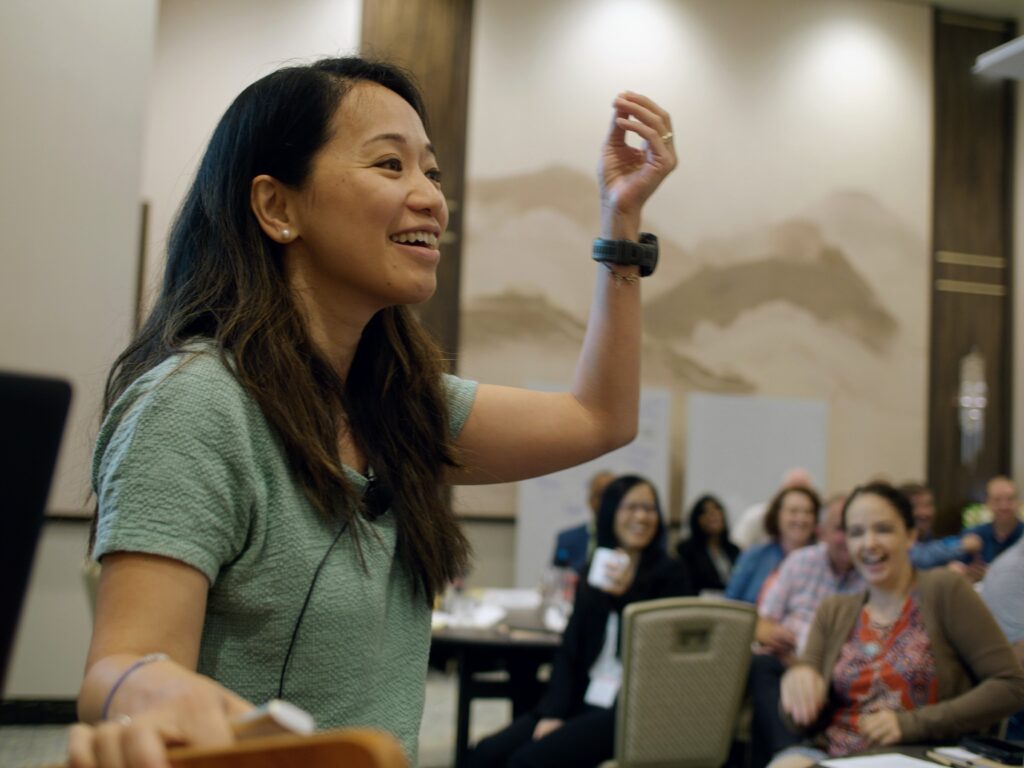May 9, 2025 / Esther Choy

John Leguizamo, Hugo Gamino and the leaders of nglmitú exemplify authentic leadership.
What happens when your childhood dreams seem impossible—not just because they’re hard, but because no one who looks like you seems to have done them before?
That question threads through the work of Emmy-winning actor John Leguizamo, chef and culinary strategist Hugo Gamino, and the senior leadership team at nglmitú—a digital media company. In a time when cultural identity is both contested and commodified, their stories reveal a critical lesson for every business leader: success isn’t linear; it ripples out from authenticity. Born of pain and discomfort, authentic leadership and storytelling open the doors to mentorship, connection—and business opportunities. The insight in this article is based on four exclusive interviews John Leguizam, Hugo Gamino and the leaders of nglmitú.
“Join the Navy. Or Try McDonald’s.”
This was the response Hugo Gamino received from a high school guidance counselor after expressing interest in becoming a chef.
The advice was dismissive. But other adults offered something better. An English teacher encouraged him to write, without worrying about grammar. That writing space opened the door to self-reflection. A principal helped widen the path. Later, Gamino encountered the book Kitchen Confidential by the late celebrity chef Anthony Bourdain—a raw, unfiltered look at the culinary world—and something began to click.
 But it was Freak, Leguizamo’s one-man Broadway show, that provided the earliest model for what storytelling could be. Equal parts comedy, autobiography, and social commentary, Freak broke ground in 1998 with Tony nominations for both Best Actor and Best Play and earned Leguizamo a 1999 Primetime Emmy—the first Latino actor to win in that category. The HBO special’s success launched a series of solo works and influenced a generation of performers, including the then-unknown duo of Matt Damon and Ben Affleck. “That’s when we wrote Good Will Hunting,” Damon told Leguizamo during a recent film shot in Sicily. In Freak, Damon and Affleck saw that everyone had stories that matter.
But it was Freak, Leguizamo’s one-man Broadway show, that provided the earliest model for what storytelling could be. Equal parts comedy, autobiography, and social commentary, Freak broke ground in 1998 with Tony nominations for both Best Actor and Best Play and earned Leguizamo a 1999 Primetime Emmy—the first Latino actor to win in that category. The HBO special’s success launched a series of solo works and influenced a generation of performers, including the then-unknown duo of Matt Damon and Ben Affleck. “That’s when we wrote Good Will Hunting,” Damon told Leguizamo during a recent film shot in Sicily. In Freak, Damon and Affleck saw that everyone had stories that matter.
Gamino, watching Freak as a high school senior, saw something else: a man who looked like him modeling honesty, messiness, and emotional range.
Now, Gamino is a key figure at HK (Hispanic Kitchen), the culinary arm of nglmitú. But his trajectory wasn’t linear. It curved through fashion, professional kitchens, burnout, and reinvention—each pivot shaped by storytelling, and a gradual willingness to stop hiding the parts of himself he feared would be rejected.
John Leguizamo’s Authentic Leadership Discovered Through Self-Reflection
John Leguizamo speaks with both gravel and fire. In a recent conversation, he wore a cap that just barely obscured his hair—dyed white for a role in Christopher Nolan’s The Odyssey. Around his neck: a thick chain. His energy toggles between ease and urgency, hurt and transcendent.
“I didn’t know people like me could be actors,” he said, remembering his upbringing in Jackson Heights, Queens. “At fifteen, I didn’t even know the word ‘representation.’”
Instead, he found reflection in Eugene O’Neill—proof that family dysfunction, brokenness, and rage belonged on stage. That permission would inform not only Freak, but the foundation of his creative work.
But for Leguizamo, storytelling wasn’t just about revelation—it was about accountability.
“I think every artist should confront themselves in their offerings. You have to be examining your demons, your Achilles, figure out your blind spots!” he said in a follow up conversation. “I had to look at my family, my parenting, and weaknesses as the head of my whole family. How have I been lacking and possibly toxic in ways I was not aware? That’s when a piece of writing can be searing and have real consequence in our times.”
The act of creating becomes, in Leguizamo’s view, an excavation, a confrontation with pain and discomfort that most people would rather look away. His solo shows were never just personal—they were cultural reckoning, starting with his own reflection.
Content, Community, and Cultural Weight
In 2022, NGL Collective (of which Leguizamo was a co-founder) and mitú merged to form nglmitú, now one of the largest Latinx digital media platforms in the U.S., reaching 15 million followers. While the company’s offerings span entertainment and lifestyle content, its stated goal reaches deeper: to reflect the bicultural identity of U.S.-born Latinos navigating multiple worlds.
“Our job is to entertain and inform,” said Joe Bernard, Chief Revenue Officer. “But it also means helping brands build real connection with our audience—because the need for that is huge.”
The company’s work lands in a cultural and political climate marked by division and demographic anxiety. “We’re a community that is oftentimes demonized,” Bernard noted. “The work of reflecting its vibrancy, pain, humor, and rage is not just creative—it’s urgent.”
In that context, what nglmitú produces isn’t just content—it’s signal. A reframing of what Latinx identity means, especially for those raised speaking English, immersed in American culture but often treated as outsiders.
Authentic Leadership Through Recipes, Roots, and the Discomfort of Memory
Food, in this landscape, is not just nourishment or nostalgia—it’s narrative. For Vanessa Vigil, Chief Brand Officer, the connection is deeply personal.
“My mom would sprinkle stories from her upbringing,” she said. “That’s how I felt connected to my culture.”
The culinary arm of the company, HK, now serves as a platform to preserve and reimagine those memories. Much of Latinx culinary heritage, Vigil pointed out, was never written down. Recipes were passed by touch and taste. “Now there’s this moment of realization—we’re losing it,” she said. “We want to be a place of encouragement, not intimidation.”
For Gamino, the work is also a tribute. “When I was ordering food in D.C., it was coming from some of the same fields my mom worked in,” he said. “Some of the farms in South Texas where my friends used to pick grapefruits before football practice. There’s a deep connection. I feel an obligation to honor that.”
That honor sometimes shows up in humble dishes. Asked which childhood meal deserves more attention, Gamino named migas: fried tortilla strips scrambled with eggs. “I still eat it. I feed it to my kids,” he said. “It was born out of what we could afford. And now, like the story of my generation, it’s been reinvented—with tomatoes, chorizo, confit.”
What Authentic Leadership Requires
Earlier in his career, Gamino masked his origins, afraid others would discredit him. “I wanted to be seen as an equal,” he said. “But I was scared people would judge me for being from a border town in Texas.”
He no longer adopts the anglicized pronunciation of his name. “Being authentic,” he explained, “is leaning into discomfort. Saying, ‘This is who I am. This is how I speak.’ It brings an open invitation for criticism—but I’d rather face that than be invisible.”
That principle—of choosing discomfort over concealment—has shaped both his leadership and his content strategy. And it mirrors Leguizamo’s own arc: a move from self-censorship to creative confrontation, from fear to artistic risk.
The Ripple Effect of Embracing Discomfort And Authentic Leadership
The stories shared by Leguizamo, Gamino, and the leadership at nglmitú point to a larger truth: success, when built on authenticity, does not follow a straight path. It ripples—through memory, discomfort, humor, and pain. Through Broadway stages, Emmy awards, and kitchen tables.
The legacy of a show like Freak isn’t just that it broke new ground—it’s that it gave others permission to look inward. To confront family myths, inherited silence, and the friction between cultural pride and societal pressure.
Discomfort is not the enemy of business—it’s the signal of untapped potential and connection. Leguizamo and Gamino remind us: if you want to reach people, you have to risk being seen. The future of authentic leadership isn’t about polish. It’s about presence.
Better Every Story
Leadership Transformation through Storytelling
"This is an amazing and insightful post! I hadn’t thought of that so you broadened my perspective. I always appreciate your insight!" - Dan B.
Get Esther Choy’s insights, best practices and examples of great storytelling to your inbox each month.



